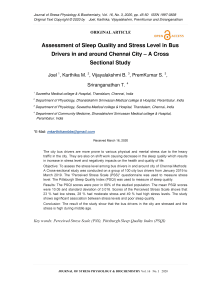Assessment of Sleep Quality and Stress Level in Bus Drivers in and around Chennai City – A Cross Sectional Study
Автор: Joel, Karthika M., Vijayalakshmi B., PremKumar S., Sriranganathan T.
Журнал: Журнал стресс-физиологии и биохимии @jspb
Статья в выпуске: 3 т.16, 2020 года.
Бесплатный доступ
The city bus drivers are more prone to various physical and mental stress due to the heavy traffic in the city. They are also on shift work causing decrease in the sleep quality which results in increase in stress level and negatively impacts on the health and quality of life. Objective: To assess the stress level among bus drivers in and around city of Chennai Methods: A Cross-sectional study was conducted on a group of 100 city bus drivers from January 2019 to March 2019. The "Perceived Stress Scale (PSS)" questionnaire was used to measure stress level. The Pittsburgh Sleep Quality Index (PSQI) was used to measure of sleep quality. Results: The PSQI scores were poor in 89% of the studied population. The mean PSQI scores were 10.05 and standard deviation of 3.016. Scores of the Perceived Stress Scale shows that 23 % had low stress, 28 % had moderate stress and 49 % had high stress levels. The study shows significant association between stress levels and poor sleep quality. Conclusion: The result of the study show that the bus drivers in the city are stressed and the stress is high during middle age.
Perceived Stress Scale (PSS), Pittsburgh Sleep Quality Index (PSQI)
Короткий адрес: https://sciup.org/143173844
IDR: 143173844
Список литературы Assessment of Sleep Quality and Stress Level in Bus Drivers in and around Chennai City – A Cross Sectional Study
- Azagba, S., Sharaf, M.F. (2011). The effect of job stress on smoking and alcohol consumption. Health Econ Rev 1, 15
- Baker C, Driver H (2008) Circadian rhythms, sleep, and the menstrual cycle. sleep medicine. 8(6), 612-623.
- Cohen, S., Kamarck, T., and Mermelstein, R. (1983) A global measure of perceived stress. Journal of Health and Social Behavior. 24, 386-396.
- Duffy C.A., & McGoldrick A.E. (1990) Stress and the bus driver in the UK transport industry. Work & Stress, 4(1), 17-27.
- Florez-Lozano J.Á. (1980) Aspectos psicofisiológicos da fadiga. Revista Brasileira de Saúde Ocupacional, 29, 19-23.
- Gangwisch J.E., Heymsfield S.B., Boden-Albala B., Buijs R.M., Kreier F., Pickering T.G., Rundle A.G., Zammit G.K., Malaspina D. (2007) Sleep duration as a risk factor for diabetes incidence in a large US sample. Sleep. 30, 1667-1673
- Hauri P. (1982) The Sleep Disorders., Kalamazoo, Michigan: The Up John Company.
- Johansson G., Evans G.W., Cederström C., Rydstedt L.W., Fuller-Rowell T., Ong A.D. (2012) The effects of urban bus driving on blood pressure and musculoskeletal problems: A quasiexperimental study. Phychosom Med. 74(1), 89-92.
- Kompier M.A., Di Martino V. (1995) Review of bus drivers' occupational stress and stress prevention. Stress Med. 11(1), 253-262.
- Labyak S., Turek F. (2002) Effects of shiftwork on sleep and menstrual function in nurses. Health Care for Women International, 23, 703-714. National Institute of Neurological Disorders and Stroke. (2017) Brain basics: understanding sleep. NIH Publication No. 17-3440c. Available at http://www.ninds.nig.gov. Accessed August 28, 2019.
- Ragland D.R., Greiner B.A, Yen I.H. & Fisher J.M. (2000) Occupational stress factors: factors and alcohol-related behaviour in urban transit operations. Alcoholism: Clinical and Experimental Research. 24, 1011-1019.
- Sagar R., Mehta M., Chugh G. (2013) Road rage: An exploratory study on aggressive driving experience on Indian roads. Int. J. Soc. Psychiatry. 59, 407-412.
- Stamatakis K.A., Brownson R.C. (2008) Sleep duration and obesity-related risk factors in the rural Midwest. Prev. Med. 46, 439-444.
- Tse J.L., Flin R., Mearns K. (2006) Bus driver well-being review: 50 years of research. Transportation Research Part F. 9(2), 89- 114.
- Yamada Y., Mizuno M., Sugiura M., Tanaka S., Mizuno Y., Yanagiya T., Hirosawa M. (2008) Bus drivers’ mental conditions and their relation to bus passengers; accidents with a focus on the psychological stress concept. J. Human Ergol (Tokyo). 37(1), 1-11.


